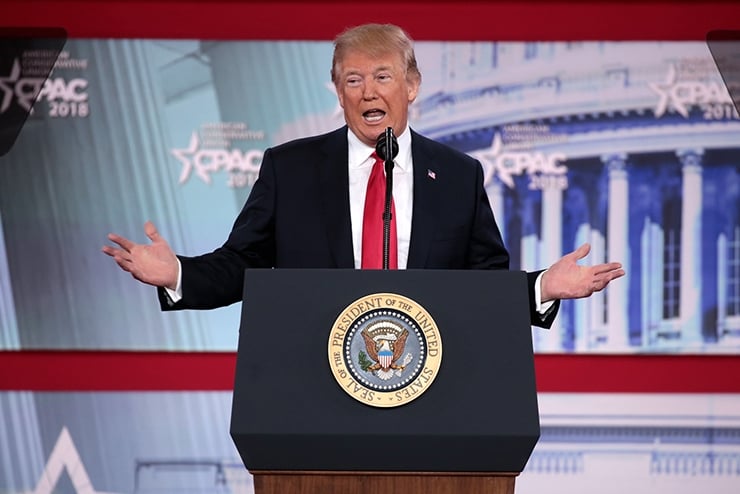President Donald Trump was hastily impeached by the House for a second time on Wednesday for “inciting insurrection.”
Legislators accused Trump of egging on, instigating, and inciting his supporters to engage in insurrection and overthrow the U.S. government, starting with a violent attack on Congress. Uttering phrases such as, “You will never take back our country with weakness,” during his speech on Jan 6, 2021, Trump encouraged his supporters “to peacefully and patriotically make your voices heard” at the Capitol building.
There are major factual errors in the House’s decision. We know now that the riots started well before Trump’s speech ended, so it’s wrong to strongly or even weakly imply that the subsequent events were a reaction to his speech. Furthermore, after the impeachment Wednesday, CNN reported that the FBI is examining evidence that the attack on the U.S. Capitol was planned, with the rioters stashing equipment in advance.
Thus, it is not at all clear that Trump anticipated the actions of the rioters, let alone supported them. Rather, the goal of his speech was to attain an electoral college victory. How so? By demanding that electors from enough Biden states be rejected by Mike Pence in particular, in his role as Vice President, and by Congress in general. It was his last-ditch effort to make the case that Congress should overturn an election that he, along with many others, thought improper. If read carefully, Trump’s Jan. 6 speech will not offer a scintilla of evidence that he incited anyone.
In retrospect, however, the speech and rally appear unwise, for several reasons. First, he lost the support of such virtue-signaling members of his Administration as Betsy DeVos, William Barr, Mick Mulvaney, Matt Pottinger, Ryan Tully, Stephanie Grisham, and Sarah Matthews. It also gave the likes of Senate Minority Leader Chuck Schumer and House Speaker Nancy Pelosi an opening to attack him.
As a supporter of President Trump, do I regret that he gave that speech? Yes. Not because of the discourse—which was excellent—but because of the “hay” his enemies were able to make of it. Schumer and Pelosi are deliriously happy that Trump spoke out as he did on this occasion; therefore, I am not.
But let us set that aside for a moment and use this episode to engage in a philosophical analysis of the law regarding incitement. “Incitement” is pretty much on everyone’s lips, Democrat as well as Republican, friend or enemy of Mr. Trump’s, so this gives a golden opportunity to reflect upon the libertarian analysis of incitement, and why it should not be considered a crime.
The difficulty with incitement comes over the issue of free will. Murray N. Rothbard said it best when he wrote:
Should it be illegal …. to ‘incite to riot’? Suppose that Green exhorts a crowd: ‘Go! Burn! Loot! Kill!’ and the mob proceeds to do just that, with Green having nothing further to do with these criminal activities. Since every man is free to adopt or not adopt any course of action he wishes, we cannot say that in some way Green determined the members of the mob to their criminal activities; we cannot make him, because of his exhortation, at all responsible for their crimes. ‘Inciting to riot,’ therefore, is a pure exercise of a man’s right to speak without being thereby implicated in crime. On the other hand, it is obvious that if Green happened to be involved in a plan or conspiracy with others to commit various crimes, and that then Green told them to proceed, he would then be just as implicated in the crimes as are the others—more so, if he were the mastermind who headed the criminal gang. This is a seemingly subtle distinction which in practice is clearcut—there is a world of difference between the head of a criminal gang and a soap-box orator during a riot; the former is not, properly to be charged simply with ‘incitement.’
In sharp contrast, when filmmaker Spike Lee was incensed at George Zimmerman for his killing of Trayvon Martin, he was not guilty of mere incitement. Mr. Lee was, instead, guilty of actively aiding and abetting the crowd to go and attack Zimmerman, who was later exonerated for his act of self-defense. Mr. Lee gave the crowd Zimmerman’s address—it was erroneous, but that is beside the point—and tweeted several times urging people to “Kill that *****,” and similar statements.
We have a continuum issue here. Lee, who went out of his way to help bring about mob violence, behaved culpably under libertarian law. The person who simply advocates violence does not. The key distinction is that Mr. Lee aided the mob by providing (though erroneous) an address for Mr. Zimmerman. Mr. Trump did no such thing. Lee did not merely incite. He aided and abetted the mob.
All of this is philosophical, of course: by any standard, President Trump did not incite the mob on Jan. 6, let alone aid and abet them.
P.S. Does anyone notice the wildly different treatment of this right-wing riot compared to the much more devastating ones put on by left-wing “peaceful” marches and mayhems organized by BLM and Antifa? I don’t think it is politically correct to even mention this disparity. So, fughedaboudit, as we say in Brooklyn.
P.P.S. Is it possible that there was a false flag operation in effect here? That BLM and Antifa snuck into the confused melee, with the goal of undermining President Trump’s authority? Enquiring minds want to know.
(Correction: The 10th paragraph of an earlier version of this article incorrectly spelled Trayvon Martin’s first name without a “y.”)
Image Credit:
Image From: Flickr-Gage Skidmore, CC BY-SA 2.0

Leave a Reply